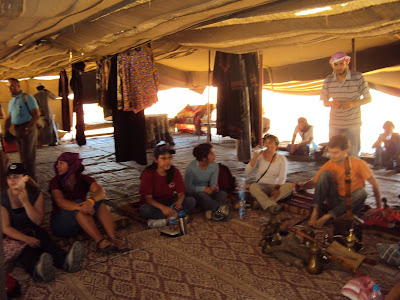
Friday, October 16, 2009
Tuesday, October 13, 2009
Obama's Prize for Peace: The World Weighs In...
Barack Obama, the US president, has said he is "surprised and deeply humbled" after being awarded the Nobel Peace Prize for 2009, less than a year after taking office.
Speaking in Washington, Obama said he did "not feel that I deserve to be in the company of so many of the transformative figures who have been honoured by this prize".
The Nobel Committee in Oslo, the Norwegian capital, said that the award recognised Obama's attempts to foster international peace and create a world without nuclear weapons.
Obama will give his $1.4m reward for winning the Nobel Peace Prize to charity, the AFP news agency reported a US official as saying.
No decision has yet been taken on exactly which organisations will benefit, the official said.
'Mutual respect'
South Africa's Archbishop Desmond Tutu, awarded the prize himself in 1984, hailed the award as "a magnificent endorsement for the first African-American president." But world reaction to the decision has been mixed, with the Taliban in Afghanistan saying it was absurd to give the prize to Obama when he had ordered 21,000 extra troops to Afghanistan this year...
Taliban criticism
The Taliban condemned the decision saying that Obama has "not taken a single step towards peace in Afghanistan".
An aide to Mahmoud Ahmadinejad, the Iranian president, said the award should prompt Obama to begin to end injustice in the world.
"We hope that this gives him the incentive to walk in the path of bringing justice to the world order," Ali Akbar Javanfekr, Ahmadinejad's media aide, said.
"We are not upset and we hope that by receiving this prize he will start taking practical steps to remove injustice in the world.
Yukio Hatoyama, the Japanese president, and Angela Merkel, the German chancellor, both said the prize should encourage everyone to help Obama rid the world of nuclear weapons.
"I think the peace prize was given with such a hope," Hatoyama told reporters on a visit to Beijing.
Merkel said Obama had shifted the tone towards dialogue in a very short time.
"There is still much left to do, but a window of possibility has been opened," she said in Leipzig.
'Extraordinary efforts'
Obama, 48, wins the award while still being the commander-in-chief of US-led wars in Afghanistan and Iraq.
"His diplomacy is founded in the concept that those who are to lead the world must do so on the basis of values and attitudes that are shared by the majority of the world's population.
"Obama has, as president, created a new climate in international politics.
"Multilateral diplomacy has regained a central position, with emphasis on the role that the United Nations and other international institutions can play."
Saturday, October 10, 2009
The View from the Other Side
My birthday last week was sad without you all now, hearing about the snow I am definitely homesick. Oh, and side note- I'm now on Twitter and Skype (I know, that took a pathetically long time) so look me up.
Now, down to business. Just a forewarning, this post is going to be controversial. But, for me, this has always been a big fat question mark on the face of American foreign policy and I came here to get the other side of any number of stories that didn't make sense from the American perspective. If someone offers me one, I'm going to report it. Please understand that I'm not selling this as fact. If this were a news story, the lead would be, "A credible source has recently suggested..." But, fact or not, I think its a good topic to open for discussion. Which, since you all (except Becky) kind of suck at commenting here on the blog, I hope you have over your own dinner tables.
As those of you that have been in college know, there are two kinds of professors out there. There's the nice, normal, professional ones that really aren't any different from the rest of us, except that they're extremely well versed on one particular topic... or at least you hope they are or you're blowing a ton of money on their class. Then there are the professors that walk a very thin line. They are either totally brilliant or totally crazy. It is generally very difficult to tell which and, more often than not, it's both. In my experience, and I'm the daughter of a schizophrenic, so I would know, extreme intelligence and insanity often go hand in hand. My source on the story I am about to deliver is just such a professor. He's either brilliant, or crazy, proving that the above is universal, because he is definitely Jordanian. But, being something of an expert on crazy myself, I am tempted to think that he's more of the former. I know for sure that he as a Ph.D in economics and that he was dean of his department at the University of Jordan. Anyway, he is the primary source for this post, so do with it what you will...
Six years ago the United States invaded Iraq. At the time they told us that the invasion was an attempt to remove an evil dictator who had not been open to negotiation, had access to weapons of mass destruction and had ignored warnings from the global community. Actually, if you check the books, none of that gives another state the right to violate sovereignty, but alright fine, these were the post 9-11 Bush years, and that is a discussion for a different day. But, and I'm just regurgitating what we already know, when we get into Iraq, we find (shockingly) that there are no weapons of mass destruction. No anthrax. Not a drop of small pox. Hmm.
Here, it is interesting to note that BEFORE the invasion of Iraq a number of stories were published in the Washington Post (http://www.washingtonpost.com/ac2/wp-dyn/A58127-2004Aug11?language=printer) questioning the evidence that Iraqi WMDs existed. Crazy thing. Turns out they didn't. Further, in the 1960s the U.S. government was able to discover easily the weapons held by the Cuban government without ever invading Cuba. It seems impossible that in 2003, the same government, with God knows how much more money and technology at its fingertips, would be unable to gather the same kind of information about Iraq.
So we're left with the question that everyone has asked: if the U.S. knew that the Iraqi's did not have weapons of mass destruction (and I would like to give my own government the credit of assuming that if the Washington Post figured it out, they did too) then why, oh why did we go into Iraq? Why, oh why did we piss off the entire world, blow untold billions of dollars and waste thousands of American and Iraqi lives? I have had this conversation several times with a friend who is as far on the right side of the political spectrum as I am on the left and neither of us could come up with a good answer. He was the one who said it might have had something to do with Bush's daddy issues. I've always hated that argument. This was not the call of one man. It was the call of a very powerful, checked and balanced government. Others have said it was about removing a dictator. I want those people to take one quick glance at Africa and, frankly, parts of South America and tell me that there were not dozens of far more interesting and dangerous dictators to choose from at the time. A few of the very dumb people have argued that it was about oil. No, dears, our Middle Eastern oil comes from the Gulf, primarily Saudi Arabia and our relationship with those countries has never faltered. Even more importantly, if a country is selling you oil, Foreign Policy 101 says you keep up a healthy economic relationship. You do not overthrow its government to attempt to steal it. Oil is less expensive than war.
So why?
A few days ago, the first logical answer to that question that I have ever heard was presented to me. Apparently, crazy and genocidal though he was, Saddam Hussein was an intelligent leader. And, though he never traveled to the west, he was very western. Under his leadership, the source says, Iraq was taking off economically. And not because of oil, which would have kept it tied to its consumers (thats us). I am told, that had Iraq not been invaded in 2003, today it would be in a better economic position than Brazil. It would be a true and independent economic power in the Middle East. Maybe the only one.
So what if- my potentially crazy source and I ask- what if the United States invaded Iraq in order to remove the threat of a real economic competitor in the Middle East. Before you write the idea off as conspiracy theory, think about it. Why would the U.S. not want an economically powerful Arab state that did not depend on the U.S. to exist? Can't think of any reasons? I'll toss out a few. Israel. Oil. al-Queda. Considering it yet?
Like I said, I'm waiting on hard evidence that Iraq was taking off economically when we went in. I'll publish it as soon as I have it. But I will probably never be able to get my hands on anything more than that.
So let me finish by saying this. In journalism school we have an argument. (The article linked above deals with it a little bit) We know that American and western reporters work within certain boundaries. Essentially, if something is going to sound crazy the public, they won't print it, even if it is a good story and they have evidence. Because they don't want to become "that crazy news source that prints crazy stuff that we Americans don't think could be true." So, in journalism school, the question becomes- who sets the norm? Is it the public or is it the reporters themselves by only reporting on the things that they know will sell newspapers? Who knows. What I do know is this: when you leave the U.S., and come to a place that looks at the same historical events, only from the other side of history, your perception changes. Things that would not seem possible in the U.S., thanks to our ideas (either created by or reinforced by every single thing we have seen and heard from media and government sources that we trust) suddenly do seem possible. For example, I got a map in Syria of the region. The land that is recognized internationally as Israel was labeled Palestine. Not just the West Bank or Palestinian territory- the whole country. This is a map distributed to tourists in a nice hotel, not something a cab driver sketched for me. They have a completely different view on things that we accept unblinkingly as fact. And one can't help but ask, then, who's right?
So maybe this sounds like conspiracy to you. But leave behind your American mindset for a minute. Look at it logically, and come up with your own solution. If you can come up with a better answer to the giant "why?" posed above, please tell me what it is, because I sure as hell can't think of one.
Okay, I've rambled long enough. Thanks for reading.
Love you all,
Caddie


















